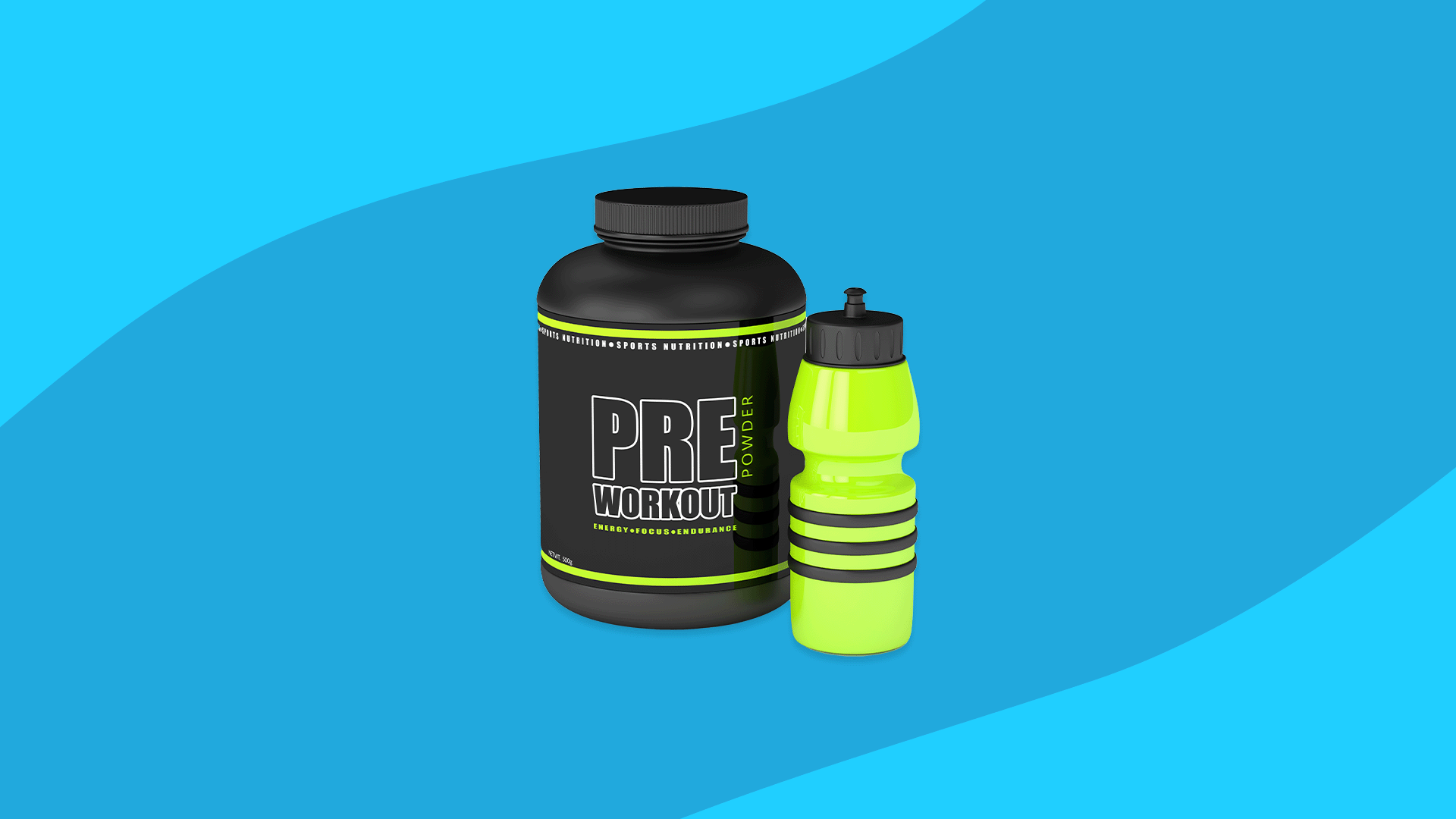For avid gym goers or those who want to improve athletic performance, pre-workout supplements promise increased energy, better blood flow, and enhanced performance. As the name implies, these supplements are taken before hitting the gym. Before busting out your wallet for an upgraded workout, it’s important to consider: Are pre-workout products all that healthy? Is pre-workout bad for you?
What is pre-workout?
“Pre-workout supplements are a category of dietary supplements that consumers take for increased energy and motivation before going to the gym,” explains Andrea Paul, MD, a medical adviser for Illuminate Labs. “Many pre-workout supplement brands claim that their products will help consumers perform better and see better aesthetic results at the gym.”
While some pre-workout supplements are sold as pre-made drinks, the majority are pre-workout powders. These powders are mixed with a set amount of water that you drink before hitting the gym. Each supplement will have its own blend of ingredients; some may focus on more natural ingredients, while others target extreme energy levels.
Is pre-workout bad for you?
“One of the main reasons why people start using pre-workouts is that they think the products will immediately improve their performance and build bigger muscles,” explains Jennifer Schlette, a registered dietitian and integrative nutrition health coach at Kitchen Substitute. “However, it isn’t as simple as it seems.”
One of the main ingredients of pre-workout is caffeine, which makes a person more alert and energized for the gym. When mixed with caffeine, the other ingredients in pre-workout can affect blood flow, making this a potentially dangerous supplement for individuals with heart conditions or high blood pressure. Because of these complications, it’s always best to speak with a medical professional before adding new supplements to your diet.
While there have been no studies on the long-term effects of pre-workout powder thus far, there has been research on the long-term effects of caffeine. A comprehensive review of caffeine found that it’s relatively safe for most adults. However, for vulnerable populations, it warned caffeine could not only affect the quality of sleep but also lead to cardiovascular issues like increased blood pressure.
That being said, pre-workout supplements do have science to back up their claims. While the evidence is preliminary and results have been mixed, some studies have shown aerobic and anaerobic performance, or the body’s ability to produce energy with and without air, improved in individuals who take pre-workout before their training session. Another study found that multi-ingredient pre-workout supplements significantly improved anaerobic power (energy production without air) while decreasing muscle fatigue.
Pre-workout side effects
Side effects of pre-workout will depend on which pre-workout supplement you take and the specific ingredients found in that formula. Since many formulas are similar, here are the most common side effects of pre-workout supplements.
1. Increased sugar intake
“Many pre-workout powders contain an excessive amount of sugar, which is a known health culprit,” explains Michael Green, MD, Head of Clinical Operations at Winona, an online wellness center.
This can be an even bigger issue for Individuals who have difficulties regulating blood sugar. On the less serious side, increased carbohydrate intake from these sugary supplements can lead to bloating. If you’re concerned about the amount of sugar in your diet, look for sugar-free pre-workout supplements.
2. Increased heart rate
“It can be dangerous to ingest large amounts of caffeine for some people, especially if they have underlying heart conditions,” Dr. Green says. “Pre-workouts can cause a person to be jittery or experience anxiety or a pounding heart [because of the caffeine].” Those side effects are due to the increase in heart rate it can produce.
RELATED: What’s a normal heart rate?
3. Sleep disruption
The caffeine in a pre-workout supplement allows you to be awake and alert during your gym session—which is great until you want to go to sleep. Depending on when you work out and take your pre-workout, you may still be experiencing the rousing effects by bedtime. While it takes around 30 minutes to feel pre-workout after ingesting it, the side effects of caffeine can last from four to six hours.
RELATED: Ways to get a better nights sleep
4. Nausea
In 2019, a survey of more than 850 people who took pre-workout powders showed 54% said they experienced side effects of some sort. One of those side effects was nausea, with around 25% of users experiencing it. This is unsurprising as caffeine is a stomach irritant, especially when taken on an empty stomach—which some users do to feel the effects of pre-workout faster.
RELATED: What can you take for nausea relief?
5. Skin irritation
Another common symptom reported in the survey of 850+ people was skin reactions. Thirty-four percent of the individuals who took the survey reported skin issues such as rash, irritation, itchiness, or flushing. This is likely due to the ingredients niacin, which can cause flushing, and beta-alanine, which has been found to cause paresthesia, or simply put, an itchiness or burning sensation of the skin.
Pre-workout ingredients
“The ingredients in these supplements vary greatly in terms of how they are supposed to work and side effects that one may experience,” says Schlette. “The main ingredients include taurine, arginine, caffeine, creatine, and beta-alanine. These mainly give you energy and increase muscle strength during your workout.”
Here’s what you need to know about the most common ingredients in pre-workout formulas.
Caffeine
Caffeine is a naturally occurring stimulant that increases energy levels and benefits exercise performance. The International Society of Sports Nutrition (ISSN) has even come up with 11 points as to how caffeine can help an athlete’s performance, including improving aerobic endurance and increasing workout performance in trained and untrained people. The amount of caffeine can vary across pre-workout supplements, so it is important to consult the ingredient panel when choosing a new pre-workout powder.
Creatine
Creatine is a popular amino acid found in pre-workout supplements. Studies have found that creatine can increase energy during short, high-intensity workouts as well as aid in the recovery of muscle damage from those workouts. Research shows creatine is a relatively safe supplement for healthy adults.
Branched-chain amino acids
Branched-chain amino acids, commonly referred to as BCAAs, are made up of three essential amino acids: leucine, valine, and isoleucine. BCAAs have been found to reduce muscle damage from working out. It’s believed they also improve endurance while exercising, but studies are inconsistent about the validity of those claims.
Beta-alanine
Beta-alanine is an amino acid found to reduce muscle fatigue during workouts. The one drawback of this ingredient is that beta-alanine causes a tingling sensation on the skin for some users. This side effect may improve when individuals take a lower dose of the ingredient.
L-Citrulline
L-Citrulline is a nitric oxide enhancer. Nitric oxide enhances blood and oxygen delivery through the body by relaxing blood vessels. It makes sense that you’d want oxygenated blood flowing through your body while working out, but evidence that it helps workouts is lacking.
Taurine
Taurine is an amino acid commonly found in skeletal muscles. It is believed to improve energy, help with muscle soreness, and aid in recovery. However, evidence for these claims is mixed.
Arginine
Another amino acid typically found in pre-workout is arginine. One meta-analysis found that arginine may improve the maximum oxygen intake in athletes, which could lead to better cardiovascular efficiency during a workout. Another meta-analysis done in 2020 found that arginine supplementation can lead to improved aerobic and anaerobic performance.
It’s important to note that arginine can lower blood pressure, so you shouldn’t take it before speaking with your healthcare provider.
How to choose the right pre-workout
“Whether or not a pre-workout supplement is unhealthy will depend on its formulation,” Dr. Paul explains. “Pre-workout supplements containing added sugars, artificial flavoring, or artificial sweeteners are likely unhealthy, and I would recommend avoiding products containing these additives.”
Checking nutrition labels will aid your search for the perfect pre-workout, but these labels aren’t always accurate. Because pre-workout is a dietary supplement, it’s not regulated by the Food and Drug Administration (FDA). Meaning, all ingredients are not guaranteed to be listed on the label.
“I recommend looking for a product with an NSF’s Certified for Sport® program,” explains Daniel Powers, the founder of The Botanical Institute, who has a background in supplement formulation and manufacturing. “NSF, also known as the National Sanitation Foundation, is a third-party certification company that audits manufacturing facilities to ensure that they are creating products according to industry best practices.”
This seal also indicates that every ingredient in the supplement is listed and that they’re not made with any banned athletic substances. By using this seal, you’ll know exactly what you’re getting.
“Even if you aren’t an athlete, buying a product with an NSF Certified for Sport seal on the label helps to ensure that the product was made right and tested for purity,” Powers says. “If Olympic-level athletes trust it, so can you.”
FAQs about pre-workout
When should you take a pre-workout?
A pre-workout supplement should be taken before working out. Typically you’ll want to take it 30 to 60 minutes before hitting the gym. Most pre-workout supplements will give instructions with a time frame based on its formula.
Why does pre-workout make you itch?
Most pre-workout supplements contain beta-alanine as an ingredient. This amino acid may cause paresthesia, or a tingling, burning sensation on the skin, in some individuals.
Does pre-workout make you poop?
Some people may feel the urge to go after taking a pre-workout supplement. It’s unclear what exactly causes this urge. While the caffeine in coffee does relax the anal sphincter, caffeine by itself, such as in an energy drink, does not appear to have the same effect. Pooping may also be an effect of the workout itself, as exercise can promote bowel movements.
Is dry scooping pre-workout bad for you?
Dry scooping pre-workout powder is a trend that became popular through TikTok. It is the practice of taking a scoop of powder and putting it directly in your mouth rather than mixing it with water. This causes the caffeine in the pre-workout to work faster and more intensely, which can easily lead to heart palpitations.
It is extremely unsafe. One TikTok user even reported having a heart attack from using this technique.
Pre-workout alternatives
You don’t need pre-workout to get in a good workout. But if you want more energy during your workouts, there are a few safer alternatives you may consider trying.
Black coffee
“If a person wants to be more awake during workouts, I recommend drinking half a cup of black coffee,” says Dr. Green. Why? “It’s natural, effective, and carries minimal risks.”
RELATED: 10 health benefits of coffee
Black tea
If you want to boost energy, but not consume all the caffeine from a cup of coffee, consider drinking black tea before your workout. It contains around 60% of the caffeine as coffee, according to Dr. Paul.
Protein powder
Protein powder is a good substitute for pre-workout, especially if you’re after muscle growth. “Protein powder is a great alternative since it helps you build up your muscles during the recovery period after a workout,” Schlette says.
Mix your own
Another option you may want to consider is buying individual ingredients and making your own pre-workout. This may be a good option for those who notice skin irritation from their pre-workout supplement. You could create a mix without beta-alanine, the culprit for most skin issues related to this supplement.
Or maybe instead of pre-workout, there is a different supplement that would be better geared for you. Check out the most popular and effective fitness supplements here.











